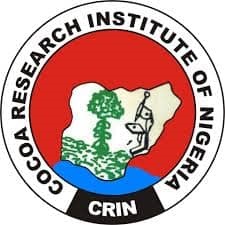Economics and Extension
- The welfare of cocoa farming households (CFHs) differs between the cocoa production seasons that is the Main and Light seasons.
- Idiosyncratic and covariate shocks affect welfare of CFHs with poor access to credit as the major shock affecting CFHs because of the frequency and severity of occurrence in South West Nigeria (SWN), and also, majority of the farming households cope by selling assets, spending their savings and selling other products available to them.
- The mean per capita household expenditure (MPCHHE) of cocoa farming households in South West Nigeria in the Main and Light cocoa seasons is N38, 818.04±14, 227.79 and N29, 194.68±17, 792.80, respectively.
- Increased age of cocoa trees, high tax levies and poor harvest due to pests and diseasesattack predisposes CFHs to shocks in SWN while insurance can help alleviate shock among CFHs.
- Increased literacy, land tenure, price increase and good harvest drives rise; lack of collateral, increased age of cocoa farmers and trees, poor access to credit and unfavorable government policies cause no improvement/change in welfare while lack of collateral, gender, poor access to credit, increased age of cocoa farmer and trees with unfavorable government policies are the determinants of fall in welfare among CFHs in South West, Nigeria.
- It was also found that certification of cocoa can enhance traceability which on the long-run leads to sustainable production and increased income for CFHs.
- It was discovered that most farmers of CRIN mandate crops do not keep records and use resources inefficiently; hence, trainings have started on proper record keeping, good agricultural practices and efficient use of resources on Cocoa, Cashew, Coffee, Kola and Tea farms (training manual and fliers developed and circulated during trainings), but there are still a lot of states yet to be covered.
- Feasibility studies have been written for the establishment of our mandate crops and developed technologies as requested by CRIN clients.
- The economics section has also been involved in some international projects (IDH/OCP/CRIN/IITA and Cocoa soils) for baseline data collection analysis, field work and report writing.
- Corp members on the mandatory one year service, students of the universities and colleges on Industrial attachments are engaged and trained in the department to prepare them for the labour markets.
- Dissemination of CRIN Technologies: The section initiated and commenced institutional Radio programme popularly called CRIN Igioro Live Phone-in Radio Programme with Radio Nigeria Premier FM 93.5 Ibadan in 2018, to promote the institute's developed technologies across Nigeria and even beyond. It is a 30 minutes live phone-in weekly programme every Wednesday between 6.30pm and 7.00pm. The programme is still been sustained. The programme is communicated mostly in Yoruba with few cases of English Language. This is due to the fact that majority of the target audience are Yoruba farmers in rural farming communities in the Southwest.
- Establishment of adopted village and schools in communities close to the institute: These include Aba-Abo village, Prospect High school Abanla in Oluyole Local Government Areas, Oyo State and Mamu Community Comprehensive High school in Ijebu North Local Government, Mamu Ogun State. In all the places, an AROC centre each was put in place. Farmers, students and Agricultural Science Teachers were trained on some CRIN developed technologies for skill acquisition and empowerment. In all the locations, poultry projects having 100 birds were established using CRIN Cocoa Pod Husk as a replacement for maize (CPH) to feed the birds. It is a strategy of introducing the technology to the farmers, students and other beneficiaries. Students were considered in order to catch them young and stir up their interest in agricultural production. The programme commenced in 2010 and is still being sustained with active participation from the end users.
- Training and capacity building of farmers, processors, commodity buyers and ADP extension agents on Good Agricultural Practices (GAP): Over 2,800 farmers and other stakeholders have been trained since 2006, fulfilling the aim of the Institute of translating research results and improved technologies into practice in order to improve production and socio-economic life of the people. The trainings were carried out in Oyo, Ogun, Ondo, Osun, Edo, Kwara, Kogi, Anambra, Enugu, Lagos, Taraba, and Abia States of Nigeria in cocoa, cashew coffee, kola and tea production.
- Television documentary: The section in collaboration with media organisations produced documentaries on some aspects of cocoa, coffee, cashew and kola production. The television stations involved were Channels, NTA, TVC, including private bodies.
- Receiving of visitors on guided excursion and Industrial Training (IT) to the Institute: Several visitors to CRIN were received by the section on a weekly to monthly basis on excursion. They are usually trained on budding and grafting at the nursery, taken round on guided tour to Value Addition Research, plant breeding, entomology, pathology, marketing, fermentary, soil and plant nutrition sections within the Institute. The visitors include farmers, students from tertiary and secondary institutions, pupils, IT students and other stakeholders.
- CRIN partnership and collaboration with foreign investors: Extension facilitated the partnership with foreign investors to develop a supply chain for global demand for Nigerian produced kola nuts. This partnership helped in sourcing healthy and chemical free kola nuts, and processed it into kola energy powder by AACE Food Processing Factory in Sango Otta, Ogun State, 2020.
- Effective hectarage of CRIN mandate crop plots at headquarters determined.
- Developed automated maps for weather parameter analysis, environmental sensibility index mapping and soil nutrient maps of plots per hectare.
- Developed area maps indicating land features such as infrastructure, perimeter and land resources, digital maps for terrain modeling indicating aspect of slope and elevation.
Outreach and Extension
Services
The aforementioned substations and experimental sites serve to facilitate the Institute’s outreach and extension services to farmers and industrialists/stakeholders operating on its mandate crops all over the country, namely:
- Serving as effective information channels whereby research findings get to farmers and industrialists. Also, the production constraints of farmers and industrialists are fed back to researchers.
- Improving the socio-economic status of farmers/farm families through improved and diversified income.
- Increasing productivity of farmers through effective utilisation of on-farm trial methods, thereby enhancing adoption of technology.
- Bringing about awareness to farmers on varied methods of utilising farm by products.


